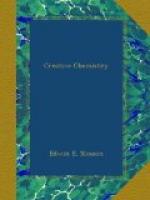Chaos is the “natural” state of the universe. Cosmos is the rare and temporary exception. Of all the million spheres this is apparently the only one habitable and of this only a small part—the reader may draw the boundaries to suit himself—can be called civilized. Anarchy is the natural state of the human race. It prevailed exclusively all over the world up to some five thousand years ago, since which a few peoples have for a time succeeded in establishing a certain degree of peace and order. This, however, can be maintained only by strenuous and persistent efforts, for society tends naturally to sink into the chaos out of which it has arisen.
It is only by overcoming nature that man can rise. The sole salvation for the human race lies in the removal of the primal curse, the sentence of hard labor for life that was imposed on man as he left Paradise. Some folks are trying to elevate the laboring classes; some are trying to keep them down. The scientist has a more radical remedy; he wants to annihilate the laboring classes by abolishing labor. There is no longer any need for human labor in the sense of personal toil, for the physical energy necessary to accomplish all kinds of work may be obtained from external sources and it can be directed and controlled without extreme exertion. Man’s first effort in this direction was to throw part of his burden upon the horse and ox or upon other men. But within the last century it has been discovered that neither human nor animal servitude is necessary to give man leisure for the higher life, for by means of the machine he can do the work of giants without exhaustion. But the introduction of machines, like every other step of human progress, met with the most violent opposition from those it was to benefit. “Smash ’em!” cried the workingman. “Smash ’em!” cried the poet. “Smash ’em!” cried the artist. “Smash ’em!” cried the theologian. “Smash ’em!” cried the magistrate. This opposition yet lingers and every new invention, especially in chemistry, is greeted with general distrust and often with legislative prohibition.
Man is the tool-using animal, and the machine, that is, the power-driven tool, is his peculiar achievement. It is purely a creation of the human mind. The wheel, its essential feature, does not exist in nature. The lever, with its to-and-fro motion, we find in the limbs of all animals, but the continuous and revolving lever, the wheel, cannot be formed of bone and flesh. Man as a motive power is a poor thing. He can only convert three or four thousand calories of energy a day and he does that very inefficiently. But he can make an engine that will handle a hundred thousand times that, twice as efficiently and three times as long. In this way only can he get rid of pain and toil and gain the wealth he wants.




